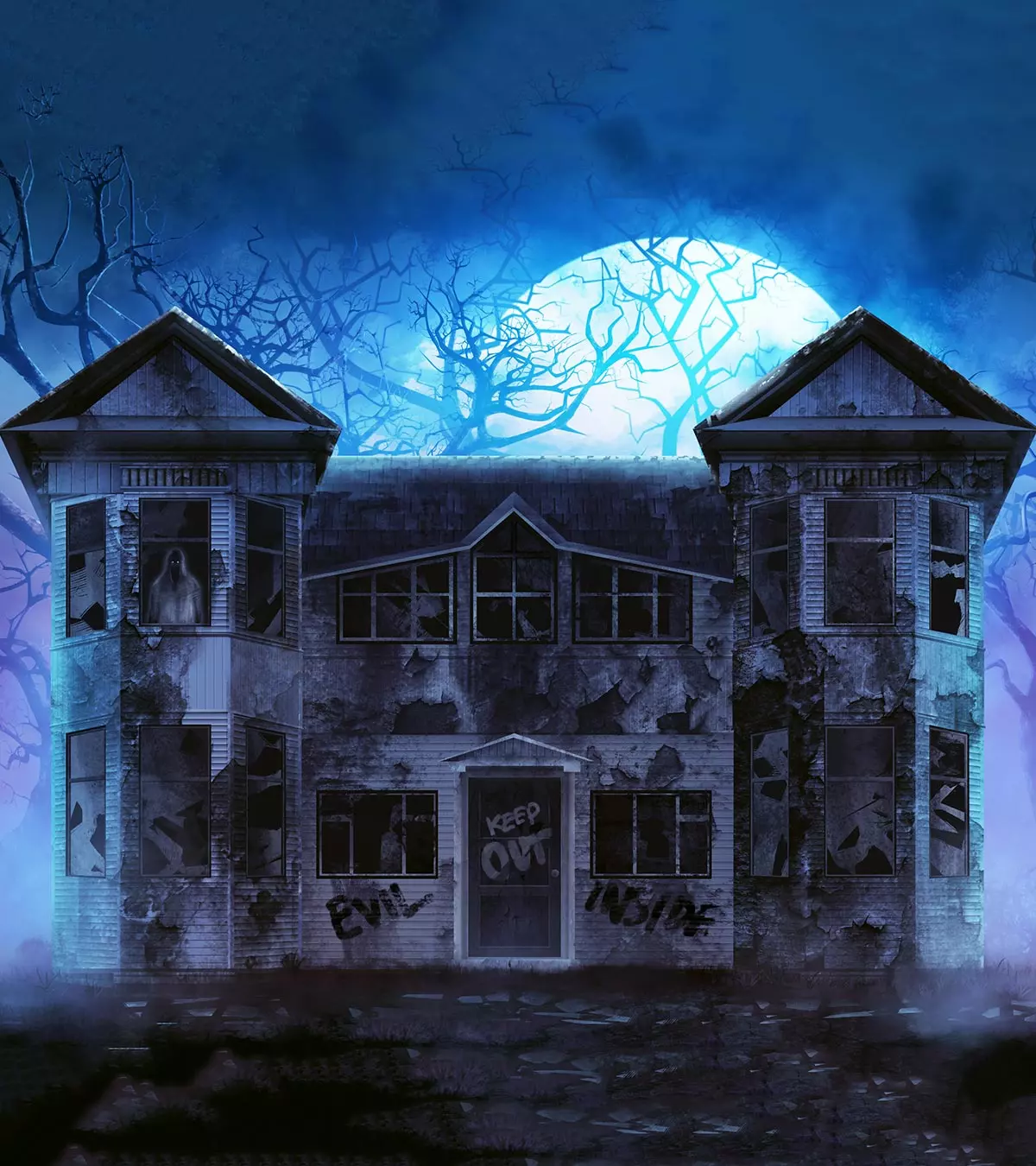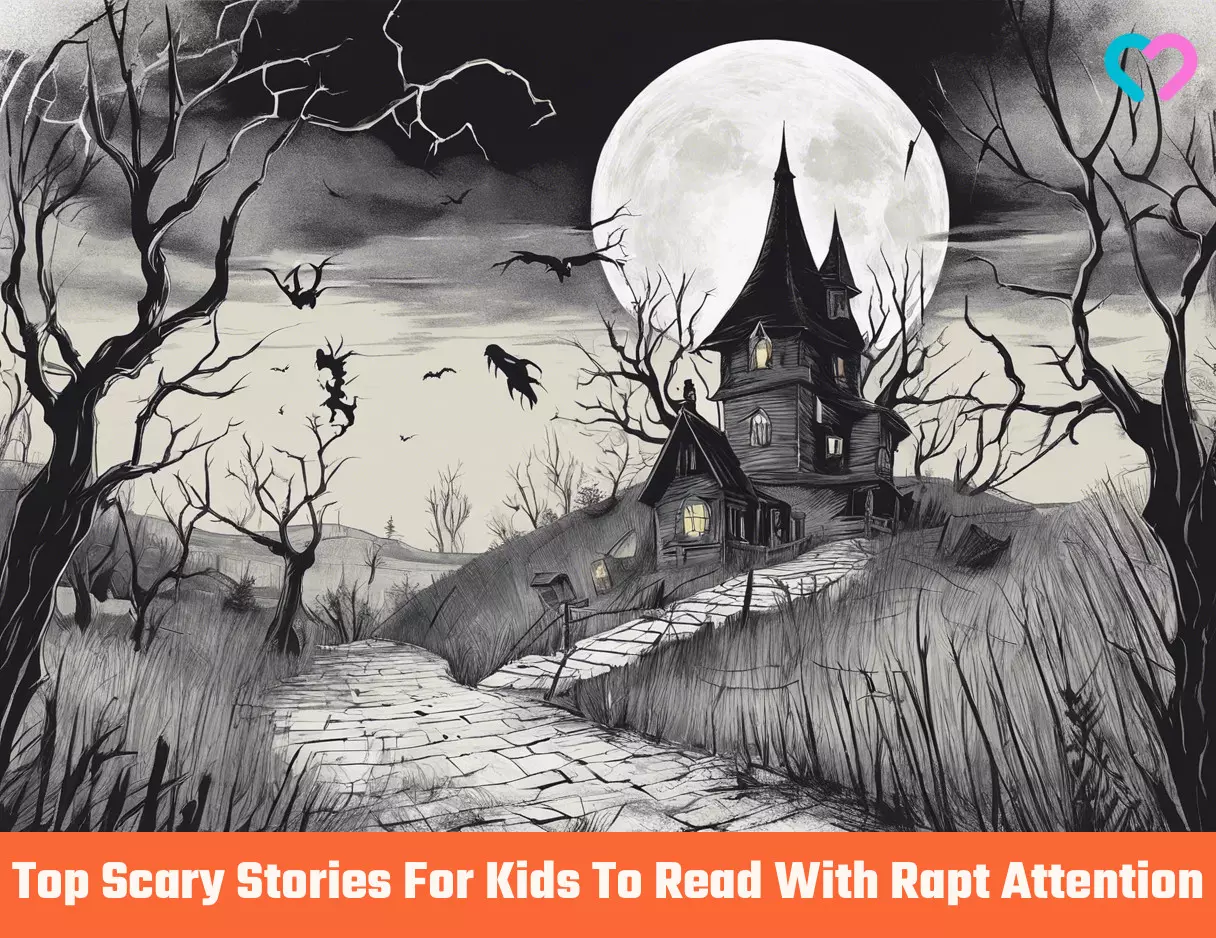
Image: ShutterStock
Nothing makes the hairs on our hands and back of our necks stand up the way ghost and spooky stories do. When narrated in the right tone, these scary stories can send a shiver down your spine. If you’re looking for scary stories for kids for gripping storytelling sessions, we are here to help you out. So, whether you’re a fan of Vampire tales, the frightening ones like Frankenstein, or the ones about haunted castles and villas, we have you covered. These stories are loved by children and adults and allow a great bonding opportunity. They can also be useful for teaching children how to control and process their emotions and cope with fear. Our list includes some spooky and thrilling stories to entertain the children without being too scary. Read on to know more.

Key Pointers
- Horror stories can be a tricky decision to make when introducing stories to your child.
- A child between the ages of six and 12 could be eager to learn about it and overcome their fears, if any.
- The Signal-Man, The Clown Statue, The Masque Of The Red Death, Something In The Water, and The Accidental Afterlife Of Thomas Marsden are some mild yet funny and interesting horror stories you can start with.
- Try different voice modulations and some sound effects to make it interesting for your child.
Are Scary Stories For Children Of All Ages?
Scary stories are not for toddlers. Also, these haunting tales should not be considered for children who may have difficulty understanding the difference between reality and fiction.
Parents should exercise caution to prevent kids from being overly exposed to horror or macabreiA term used to describe something dark, disturbing, or horrifying genres early on, as that can have a profound effect on their life (1).
Until they are of a matured age, it is best to prevent kids from reading horror stories or watching unsettling movies.
Here is a collection of spooky, creepy, and hair-raising stories that are mild, funny and interesting, if you think your child can handle them well. You may check our stories, and pick the ones that suit your kid’s age and reception ability.
Short Scary Stories For Kids
Here is a collection of spooky and creepy stories you can tell your kids. What you are about to read are short, abridged versions and summaries of the actual stories. You can add dialogues of your own when you narrate the story to make it interesting.
1. The Monkey’s Paw
Author: W. W Jacobs
One man called Sergeant Major Morris owns a monkey’s paw that has magical powers. He tells his friend Mr. White and his family, the wife and son, about its powers. It grants its owners any three wishes they ask for; the sergeant-major warns Mr. White that although it grants the wishes, only disaster comes with them. Nevertheless, the family buys the monkey paw from him, and the sergeant leaves.
The son holds the paw and asks for some money. The next day, after the son goes to work, an employee of his company comes and informs Mr. White and his wife about the demise of their son in an accident, and gives them the monetary compensation — the same amount they wished for.
Mrs. White wishes that their son comes back home, alive. A knock at the door is heard, and the knocks get violent slowly as somebody wants to come in and get hold of the paw. Mr. White understands where it is going. He makes a final wish. The wife opens the door, and there is nobody.
 Quick tip
Quick tip2. The Furnished Room

Author: O. Henry
A young man goes about looking for a place to live in, in the city of New York. Finally, he gets one. When the housekeeper tells him that the room is often occupied by theater people, he asks her if a young woman named Eloise Vashner ever lived there. The housekeeper denies it.
The young man has come to the city to find his lady love Eloise. He has spent months inquiring with the theater managers, audiences, et al, but in vain.
Once he gets to the furnished room, he sits in his place and sees the former tenants’ belongings and their traces. Suddenly a waft of sweet scent comes to him. He immediately recognizes it as Eloise’s perfume. He goes mad, he talks to the scent and starts believing that she has been here in the same room. But, he finds nothing. He asks the housekeeper, who again denies knowing anything about her.
Defeated and disappointed, he turns the gas on and awaits death. Meanwhile, the housekeeper tells her friend about him. She says how she did not tell the man that a tenant killed herself in the same room, a week ago, with the gas turned on.
3. Lost Hearts
Author: M. R James
Stephen Elliott, an orphan boy, comes to live with an older cousin Mr. Abney at a remote country mansion. Mr. Abney shelters him, as he’s a reclusive man. He is a professor of Greek and keeps particular interest in Pagan religions, and is obsessed to become immortal.
The servants tell Stephen that he’s a kind man and gave shelter to two children in the past. But they mysteriously disappeared. Stephen repeatedly gets visions of a gypsy girl and a foreigner boy with missing hearts. They try to convey something to Stephen in his visions.
One day he hears Mr. Abney speaking to someone. But as he opens the door, Mr. Abney is found dead. In his report, is written about his plans. He wanted to become immortal by sacrificing three children, burning their hearts and mixing their ashes in the wine that he drinks. His third sacrifice was going to be Stephen. However, the other two ghost children kill him before he could kill Stephen.
 Do remember
Do remember4. The Clown Statue
Author: Drac Von Stoller
A young teenage girl babysits for a wealthy family in their enormous mansion. The father of the children tells the girl to put the kids to sleep and watch TV in their room so that she can watch on the children.
Once the kids fall asleep, she goes to the couple’s bedroom and finds a big clown statue in one corner of the room. She feels that the clown is staring at her continuously and its eyes are following her as she moves. Irritated, she covers it up with a blanket and calls up the father telling him that the clown statue makes her uncomfortable and she would like to shift to another room.
The father tells her to leave with the kids right away because they never owned a clown statue ever.
The girl takes the kids and runs out of the house. They inform the police, who come and arrest the man, who is a murderer stalking the family’s children for months. The children have been telling the parents about seeing a clown in their bedroom at night, but the parents never believed them.
 Point to consider
Point to consider5. The Tell-tale Heart
Author: Edgar Allan Poe
The story begins with the narrator saying that he is hypersensitiveiA personality trait of being overly sensitive to one’s emotions but not a madman. He says coolly about killing an old man who never did him any wrong. The narrator had no interest in the old man’s money or anything in particular, but he could not tolerate his pale blue eyes.
The narrator goes on to explain that he is not mad because he is very rational. He planned everything correctly before the murder.
While the old man sleeps, every night, he would sneak in with a lantern and watch him sleep. On the night of the murder, the narrator’s lantern slips from his hand, and the old man wakes up. He kills the old man. To make sure he is dead, he cuts the body up and hides the remains under the floor.
Three policemen come and say that the neighbors have complained about a scream at night. He tells them he is the only one at home and the old man is out of town. He is so confident that he takes the policemen to the old man’s room and they sit on the floor under which he was buried.
However, as they start talking, the narrator becomes increasingly horrified by something. He hears something, the thumping of a heart that keeps getting louder and louder.
Terrified, he tells the police where he hid the body and that the old man is the one making the sound.
6. The Lottery

Author: Shirley Jackson
On a summer morning, in a village, people gather for their annual lottery. Festivity and celebrations are on, with only a few people in the crowd showing signs of tension. The annual lottery has been a ritual in the village for long.
Mr. Summers and Mr. Graves come with the black lottery box. The lottery begins. The head of each family in the village comes and draws out paper slips from the box. As it continues, townspeople engage in conversation, and a sudden uneasiness and tension prevail in the atmosphere.
One man, Bill Hutchinson, finds that his slip has a black dot in it. He is declared to be the lucky person. But Mrs. Hutchinson starts protesting and we perceive that it’s not a matter to celebrate, as it seemed initially. The villagers ask her to be a sport!
The Hutchinson family has five members, and Mr. Summers keeps five paper slips for each member to draw from the black box. Mrs. Hutchinson draws the slip with the black dot in it.
Mr. Summers summons the villagers to “finish it fast,” and they begin throwing stones at Mrs. Hutchinson.
7. The Willows
Author: Algernon Blackwood
The narrator and his friend are sailing down River Danube. They have set out on a canoe trip, and the atmosphere around them looks melancholiciSomething that gives an intense feeling of sadness , strange, and sinister. It seems like there is some bizarre power in the place, some secret.
Suddenly, the two friends see a traveler who is warning them from a distance not to cross but go back. He sails his boat very fast as if escaping from something. But, the friends do not go back.
At night, strange dark shapes, shadows, and bizarre noises tap outside their tent. Next morning, they find that one of the paddles is missing and a slit can be seen in the canoe itself. If they do not repair it, they cannot go back; their food is also missing.
During the second night, one of the friends tries to jump into the river “as a sacrifice”. But the narrator saves him. Next morning, that friend tells the narrator that this mysterious land has found another man as a sacrifice, and now they may be safe. They see a dead body lodged in the roots beside the river shore. When they go to touch the body, some living forces rise from it and disappear into the sky, and the body gets swept away by the river.
8. The Fall of the House of Usher
Author: Edgar Allan Poe
The narrator comes to the House of Usher to visit his sick childhood friend Roderick Usher. Roderick Usher wrote to him that he has a disease of the mind and needs help. The narrator stands outside and watches the vast edifice of the Usher house.
Roderick and his sister are the last of the Usher bloodline, and the family was famous for their dedication to all forms of arts – painting, music, literature.
The narrator meets Roderick and finds him ill. Roderick explains that he has become super sensitive to things like sound, light, and taste; he assumes that he will die soon. He also says that his sister, Madeline suffers from catalepsy, a disease that gives seizuresiAbrupt, uncontrollable physical movements and behavioral changes driven by irregular electrical activity in the brain . He says that she will die soon and also says that this mansion is sentient, which means it can feel things. The narrator feels the negativity and tries to help Roderick get off this feeling by spending time on the arts.
But one day Roderick tells the narrator that Madeline is dead. The narrator and Roderick entomb Madeline’s body in a vault under the mansion.
One week later, a storm brews up, and both the friends are unable to sleep. They decide to read a book and pass the night. But as the narrator starts reading it aloud, all the sounds start resounding from somewhere down the mansion. Roderick Usher freaks out and shouts that they had buried Madeline while she was still alive, and now she’s coming for him.
The doors open with a bang, and they see Madeline standing there. She jumps on Usher, who gives a painful cry and dies along with his twin sister. The narrator runs away in horror. As he looks back, he finds the House of Usher cracking and sinking into the dark.
9. The Masque of the Red Death
Author: Edgar Allan Poe
In the kingdom of Prince Prospero, a terrifying disease called Red Death strikes the land, killing half the inhabitants of the kingdom. But Prince Prospero ignores it and instead celebrates with a thousand of his favorite ladies and knights.
He shuts the door of his castle to the outside world and starts partying with music, wine, and his fools. Prince Prospero welds the gates of his palace so that no one can go out or get inside.
Six months later, Prince Prospero decides to throw a masqueradeiA party or festival in which people are disguised as wearing masks and colorful costumes. ball. The prince arranges a set up with seven rooms of different colors – orange, blue, green, violet, white and black. The black room is eerie and looks like death; it has blood colored windows, black walls and an enormous black clock, which chimes every hour. The sound is so scary that people stop and stare.
At midnight, the clock strikes and everyone sees an unusual person in the party wearing the costume of a corpse. On seeing him, Prince Prospero gets very angry and chases the person as he walks towards the Black room. But just as he’s about to enter, the unknown man looks back at him, and Prospero dies.
All his guests are horrified and find out that nothing is underneath the mask. It was Red Death that came to the Prince’s party.
10. The Vampyre

Author: John William Polidori
A young Englishman named Aubrey meets a man of mysterious origin Lord Ruthven. Aubrey goes to Rome along with Lord Ruthven, but their relationship gets strained when Ruthven seduces a mutual friend’s daughter.
Aubrey then goes to Greece and meets a young woman Ianthe, with whom he falls in love. Ianthe narrates to Aubrey about the famous legends of the vampire there. Soon after, Ruthven joins Aubrey in Greece, and eventually Ianthe is found killed by a vampire.
Without connecting the dots, Aubrey accompanies Ruthven in his travels. One day, the two men get attacked by bandits, leaving Ruthven fatally wounded. Before dying Ruthven makes Aubrey swear that he will keep his death a secret for one year and one day. Aubrey finds Ruthven a little suspicious.
Aubrey comes back to London but shockingly sees Ruthven coming there shortly, very much alive. Ruthven again tells Aubrey to remain faithful to his oath; soon after, he starts seducing Aubrey’s sister. Aubrey tries but fails to protect his sister. Defeated, he undergoes a nervous breakdown.
The day the oath ends is the day Ruthven and Aubrey’s sister are getting married.
Aubrey is breathing his last. He writes a letter to his sister and mentions everything about Ruthven. Unfortunately, the letter does not reach on time, and they get married. On the wedding night, the sister is found killed by a vampire with her lifeblood sucked out. Ruthven goes missing.
11. The Signal-Man
Author: Charles Dickens
The narrator meets a signal-man one day. The man tells him that he sees apparitionsiAn unexpected appearance or perception of something supernatural on the railway track, but the narrator doesn’t believe him.
He goes on to narrate that one day he saw a ghost in front of a train, desperately waving and signaling the train to stop. But no one except him can see these ghostly apparitions, and six hours later they learn about a gory train accident.
Another day, the ghost reappeared and looked about helplessly with sad eyes at the passing train. A few hours from then, they learned about a woman’s death on the train.
The third time, the signal-man gets a vision where he hears a bell ring and sees a man closing his eyes with one hand and waving with the other.
The next day, the narrator comes to know that the signal-man had been knocked down by a train. And the train driver had closed his eyes and waved his hand exactly the way the signal-man had envisioned.
12. Oh, Whistle, and I’ll Come To You My Lad
Author: M.R. James
The protagonist Parkins is a skeptical Cambridge professor. He is on holiday in Burnstow, a fictional town in England. He goes to investigate a Templar ruin on behalf of a colleague and finds a whistle.
The whistle has two inscriptions in Latin. The first inscription is Biblical and reads “Who is it that comes”. The second one roughly means “thief, blow, weep”. Not understanding, Parkins blows the whistle.
That night Parkins dreams of a terrified man fleeing towards him and collapsing right in front of him. In the distance, he could see the man’s pursuer. The very next day Parkins meets a boy, who is frightened by a white figure that appeared at Parkins’ window hotel.
When he returns to his hotel, he finds that the second, unused room’s bed in his room is in disarray. While he was all alone, he clearly sees someone getting up from the empty bed. The figure he saw was all covered in the bedclothes and attacks Parkins. Parkins is luckily saved by one of the other guests staying in the hotel.
13. Night of the Millennium
Author: Ruskin Bond
A young, rich man named Pasand goes out for a stroll on New Year’s Eve.
The next day will bring in a new millennium, 2000, in which he believed only prosperous and well-educated elites like him would rule. He saw no place for mediocrity and no place for anything like the unknown.
He walks past a 150-year-old cemetery. Pasand had only contempt for the dead; those who cannot fight and stand against time were losers in his eyes.
He sees a faint light flickering from one side of the graveyard.
He remembers that a woman lives there with a brood of children. She was young and comely, and Pasand had no honorable intention towards her. He thinks that the woman would do anything to offer some food to her kids. He goes to use her and shows no respect towards the woman.
Suddenly the woman bites him sharply on the neck and cheeks. Pasand cries out in pain. But several small mouths and sharp teeth press against his flesh.
His screams mingle with the cries of the jackals and the children of the woman. She simply says, “Patience, my children, patience… There is more than enough for all of you.”
14. The Rats in the Walls

Author: H. P. Lovecraft
An American Delapore moves to his ancestral property in England after his only son dies in the World War I. He restores their old hereditary estate Exham Priory. But once he moves in with his cat, Delapore is frequently haunted by the scurrying sounds of rats behind the walls of the house.
He goes to investigate and learns that his family had built an underground city for many centuries. In that city, they raised “human cattle” they can feed on. One of Delapore’s ancestors had stopped this horrific practice by killing the entire family while they were asleep and left the country. He left the remaining human cattle and one surviving relative to be killed by the rats inhabiting the cesspits of the city.
After hearing such gruesome news, Delapore loses his mind. He is found attacking one of his friends in the dark and begins to eat him while he talks in a strange mixture of languages. Like Delapore, there was another investigator, who too went mad previously.
After this incident, Exham Priory gets destroyed and the investigators strived to bury the city. Delapore keeps claiming his innocence by saying that the ones who ate the man were the rats in the walls. He still keeps hearing the rats scurrying behind the walls of his cell.
15. Something in the Water
Author: Ruskin Bond
The narrator was walking down a path near Rajpur in India when he sees a cool, inviting pool. He dives in for a swim. But soon, he feels something slimy and long pass across his legs. It sucks at his foot. Terrified and disgusted, he swims out of the pond. As he stands on the bank, there are no signs of life, stirring or movements.
A few days later, he leaves for Delhi and returns to Rajpur ten years later. As he takes a walk, he is tempted to find out if the pool still exists; yes, it is right there although the surroundings had changed, with a few new buildings and houses.
He sees a few laborers draining water off the pool. Overseeing the operation is a man, who is the owner of a new school built recently. On enquiring, he tells the narrator that two of his boys had drowned while swimming, although the pool was off limits and they weren’t supposed to be there.
The bodies were broken, with limbs twisted, faces disfigured but the verdict of death came only as drowning.
The narrator and the school owner, Mr. Kapoor sit there talking as one last laborer works in the pool.
Suddenly an enormous succubus appears from below and stands taller than the man. It drags him under the water, and it gets still and silent. Then the mangled body of the man shoots out of the water.
Friendly Ghost Stories
16. Madeline and the Old House in Paris
Author: John Bemelmans Marciano
The head of Madeline’s boarding school, Lord Cucuface, turns up suddenly for an inspection of the school’s attic, as a rumor goes around that it is haunted. However, he could not find any ghost, but finds an old telescope and takes it home for himself.
Later, Madeline and the Spanish Ambassador’s son Pepito hear moaning and howling from the attic. When they go there, they discover a ghost. The ghost was an astronomy enthusiast, Felix de La Morte. He wears a wig and frilly garments. He is sad as he cannot find his telescope. He narrates to the children how he died falling off from this school’s roof while striving to watch a comet that can be seen every 221 years.
The story is about Madeline and Pepito’s adventure on retrieving the telescope for the ghost to watch the comet at least this time. They go around Paris all throughout the night and by the end, the three of them become friends and watch the comet on a beautiful starry night.
17. Leo: A Ghost Story
Author: Mac Barnett, Christian Robinson
Leo, a good ghost, reads books in an old house. But, a family moves in and he can’t have his peace and privacy anymore. He tries to welcome them but the family gets frightened. They hide in the bathtub. So, Leo decides to wander outside the house.
But when he goes out, the world is overwhelming, loud and unwelcoming for him. Luckily, he finds a girl called Jane, who spots Leo when she was drawing on the sidewalk. She is a tiny girl with a vivid imagination and invites Leo to play with her. They become friends and play Knights of the Round Table. Leo finds himself happy again.
To Jane, Leo is an amazing imaginary friend but Leo is afraid that when Jane comes to know he’s a ghost she will be scared too. However, Leo is smart enough to use his supernatural tricks and resolve all hurdles that come in the way of their friendship.
18. Goldfish Ghost

Author: Regan McMahon
The ghost of a black-and-white fish floats upside down in a water bowl in a bright, colorful bedroom of a kid. But there is no one to talk to him, and to find some company, he floats out of the bowl and the window. He keeps floating by the townside, sea, the fishing boats, and seagulls. Nobody notices him there.
He starts floating past a busy shopping market, but there no one seems to be looking for his company. He floats by a beach full of people, but the bathers too are not interested and no one even glances at him. He decides to go back to his bowl and finds a new fish living there. But he didn’t think of her as a good company.
It’s night time and he floats out again, this time to a lighthouse. Here, he meets the ghost of the lighthouse keeper. She is a sweet lady ghost, black and white like him. Very unlikely, they find each other to be good company and she takes him in.
19. The Graveyard Book
Author: Neil Gaiman
Jack murders the entire Dorian family, except their toddler who is upstairs. The murderer does not know that the toddler had walked out of his crib to explore outside.
The baby reaches a cemetery after being chased by the murderer. Some ghosts find the boy there, and chase away Jack. After much discussion, the ghosts decide to raise the baby. They name him “Nobody” and call him “Bod” for short.
Jack keeps searching for the toddler and knows that he is safe as long as the little one is inside the cemetery. As the child grows, he is granted the Freedom of the Graveyard, and he eventually thinks he needs to see the world of the living.
But the world of the living is the most dangerous for Bod. He makes a very good living friend called Scarlett. Eventually, Bod fights and kills Jack. But Scarlett is too scared to learn about Bod’s abilities. So he takes away the memories from her. Scarlett returns to her house.
Bod is now about 15 and is about to lose the power of seeing ghosts. He says goodbye to his ghostly family and friends and leaves the graveyard to embark on a new life.
20. Topaz
Author: Ruskin Bond
One morning, as the narrator was gazing out of his window in the pine-clad slopes of the Himalayas, he sees a girl hanging from an ancient oak tree, and runs to save her.
As he walks, he is called by a pretty young girl named Hameeda. She tells him that people often see the ghost of the girl who died on that tree, and the girl was her sister. She had killed herself because she loved someone and was forced to marry someone else. The boy whom she loved found himself a job and moved on.
Hameeda tells the narrator about her father, who was a baker, and her two young brothers. One day, the narrator observes a pretty topaz ring on her fingers and appreciates it. She immediately slips it into his finger, saying that it will bring him good thoughts and he will write better.
While taking a walk, the narrator sees Hameeda collecting ferns down the stream. He accompanies her, and they speak; he realizes that they fell in love.
But Hameeda does not come back anymore. The narrator keeps waiting for her, but no luck. One day, he sees a young boy resembling her, selling biscuits. He stops him and asks if he had a sister called Hameeda.
The brother reluctantly tells him that it’d been long that she is dead. The narrator protests that it was Hameeda’s sister who died. Her brother says he had only one sister called Hameeda.
Hameeda was gone. Only her topaz ring and memories stay behind with the narrator.
21. Around a Temple
Author: R. K. Narayan
The Talkative Man tells the story of an Indian forest officer who goes abroad and comes back as a rational and cynical man, who only believes in things he could touch, see or hear. At everything else, he scoffs, especially to the idea of God.
In Mempi forest, there is a tiny ancient Anjaneya temple. People believed in the presiding deity and no one would cross the temple without offering a prayer.
It is located at such a part of the town that everyone had to cross it on their way. Every Saturday evening, thousands of people would gather there to offer their prayers.
The officer would cross the temple every day and think that the municipality should tear it down and stop any traffic jam caused by superstitions. On one Sunday, his driver comes to him asking for leave.
On inquiring, he says that he had vowed to the God to offer him prayers if his sick child got better. After much argument, he lets him go but fires the driver.
The officer drives the car himself and starts off for the club. As he reaches the temple, some force takes over the control of his car, and he could not stop, nor take a left turn to the club. He goes round and round the temple.
When the driver and his family arrive at the temple, the car stops with a jolt. The driver asks the officer to get off the vehicle. The terrified officer loses consciousness.
The temple priest wonders why the officer had to go around the temple 500 times, while people in great need took a maximum of 180 rounds. The officer flings a coin in the temple tray and reinstates the driver. To him, it was a ghost.
22. The Accidental Afterlife of Thomas Marsden
Author: Emma Trevayne
Thomas Marsden is a grave robber. He’s into this bad business for years. One spring night in London, he opens up an unnamed grave, in which lies the body of a boy covered in dirt and dust. But the dead body looks exactly like Thomas.
Lots of strange things follow. Along with the buried dead body is a mysterious spooky note, and tickets for a show done by a man called Mordecai. Mordecai claims that he can talk to the dead.
Thomas begins to doubt his own identity and the dead boy’s. For that, he seeks Mordecai’s help. But to know the secret he has to outsmart Mordecai and free all the fairies that Mordecai had kept enslaved for years.
The last person who went on that venture was dead in front of the gateway. But Thomas has to save the fairies.
In his journey, he learns that his parents are not the real ones. He belonged to the “faeries,” who had once rejected him a home.
23. The Open Window

Author: Saki
Mr Nuttel, new in the neighborhood, visits one Mrs. Sappleton’s house. A young woman named Vera frightens him with her lies about her uncle Mr. Sappleton and two of his younger brothers.
She says that three years ago they went down hunting in the forest with their spaniel but got lost in a bog and their bodies were not found. Her aunt, submerged in grief, kept the French window open all the time. She believed that one day they would enter from that window exactly the way they had once gone out. Mrs. Sappleton appears and confirms Vera’s story about the open window.
Suddenly, they see the men entering the house through the French window along with their spaniel and Mr. Nuttel is horrified beyond measure. He runs away. In the end, the story is resolved.
The men had gone out hunting that very day and Vera simply lied to Mr. Nuttel out of mischief. But, being a habitual liar she explains to the men that Mr. Nuttel was once traumatized by a pack of pariah dogs and therefore ran away on seeing the spaniel.
Aren’t these stories intriguing? But choose them wisely to narrate to your kids. Follow our tips on that.
How To Narrate Scary Stories To Kids?
Remember that your aim of telling a scary story to a kid is to entertain them and not to scare them. So before you tell them short and scary ghost stories for kids, you should be prepared.
- Read the story thoroughly and see if you can tell the story as is, or it needs modification to make it less scary. Understand that the same story may be scary for one kid while fun for the other.
- Horror stories for kids may be scarier than others. Try to make them funny by modifying your narration.
- Be wary of the terms you use – avoid anything like ghosts or spirit or shapes, etc., which can be conjured up by your kid’s imagination.
- Use different voice modulations to change the mood from interesting to scary and even funny.
- You can also include some sound effects to make the plot captivating, suspenseful, and less scary.
- Use props such as sticks, bells, and paper to add more enthusiasm to the storytelling process and engage the kids.
- Never let them believe that the stories are true. Make it very clear before and after the narration that these stories are fictitious. Such things do not happen in real life.
- Stay close to your kid, or better, let them sit in your lap or cuddle up to you when they listen to the story. They’ll feel safer that way.
- Avoid telling these stories in the dark, unless it is around a campfire. Try telling these stories during the daytime – they are less scary and unreal then.
- Do not dwell on a story for too long, as that can create a lasting impression on your child’s mind.
Use discretion to pick stories you think that your child will enjoy. Remember to narrate the story in an interesting way to make it less bone-chilling for younger children.
Frequently Asked Questions
1. Why is horror good for kids?
Some age-appropriate horror stories and scary movies for kids and teens are surprisingly good. They can help them understand their fear and make them deal with them. Sometimes, horror stories provide excellent moral lessons too.
2. Is Scary Stories to Tell in the Dark okay for children?
Scary Stories to Tell in the Dark is a movie inspired by Alvin Schwartz’s horror stories. It is not recommended for children as it contains violence and horrifying scenes. However, teenagers can watch it.
3. Is the horror genre appropriate for middle school?
Middle-aged children are usually between six and 12 years. They are curious, want to experience fear, and overcome it. So they can watch horror movies. However, if you think your middle schooler is too sensitive and might not be able to handle the loud sound and terrifying scenes, then you can either postpone the plan or join them in watching.
Illustration: Top Scary Stories For Kids To Read With Rapt Attention

Image: Stable Diffusion/MomJunction Design Team
Don’t watch alone! Get ready for 8 spine-chilling ghost stories that will make your hair stand on end. Be prepared to be scared!
References:
- Scary movies, TV have lasting effects on youth
https://news.umich.edu/scary-movies-tv-have-lasting-effects-on-youth/
Community Experiences
Join the conversation and become a part of our nurturing community! Share your stories, experiences, and insights to connect with fellow parents.
Read full bio of Elisabeth Daly
Read full bio of Harshita Makvana
Read full bio of Deepa Thomas
















